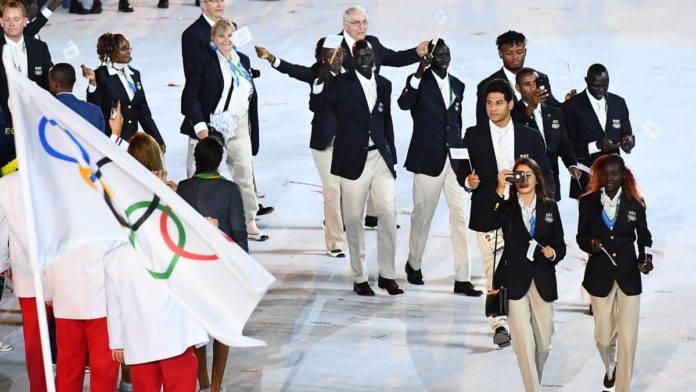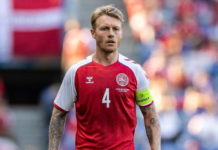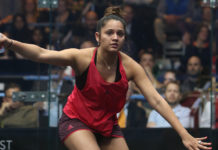Tokyo: As we enjoy the daily comforts of our life at home, there are many who are still struggling for existence even in their own country. Some are forced to flee their countries due to war or many other reasons and take shelter in a different country. This is what called A ‘Refugee’.
They find it hard to survive on a daily basis being devoid of many necessities. However, through sports, a bunch of men and women are slowly but steadily making waves of hope sending a message to millions of refugees around the world, and inspire people who went through the tough paths with the strength of their spirit.
Different journey. Same dream.
We are the @Tokyo2020 IOC Refugee Olympic Team! 💪#RefugeeOlympicTeam #WithRefugees #StrongerTogether@Refugees | @Olympics pic.twitter.com/o3EWuiY6pO
— Refugee Olympic Team (@RefugeesOlympic) June 8, 2021
They are called the Refugee Olympic Team — a special squad of 29 that will compete in various events at the Tokyo Olympics next year. James Nyang Chiengjiek, Yusra Mardini, Masomah Ali Zada and Cyrille Fagat Tchatchet are a few of those special ones who were given a platform by the International Olympic Committee.
They made their debut in the Rio Olympics in 2016 and although they didn’t win any medal their participation was seen as a symbol of the indomitable spirit of life and determination “I speak on behalf of the entire Olympic Movement when I say that we cannot wait to meet you in person and to see you compete in Tokyo,” said IOC president Thomas Bach.
“When you, the IOC Refugee Olympic Team and the athletes from the National Olympic Committees from all over the globe, finally come together in Tokyo on 23 July, it will send a powerful message of solidarity, resilience and hope to the world. You are an integral part of our Olympic community, and we welcome you with open arms,” he further added.
Official termed EOR or ‘Equipe Olympique des Réfugiés’ (in French), these athletes are mostly originated from the strife-torn regions of Syria, Iran and South Sudan but now reside in various European nations where scholarships provided by the IOC. In fact, there were 56 promising refugee athletes from the best nations who were sweating it out in training to make it to the 29-member squad for the Tokyo Olympics.
Those 29 men and women will battle it out in 12 sports — athletics, badminton, boxing, canoeing, cycling, judo, karate, taekwondo, shooting, swimming, weightlifting, and wrestling. But it’s not about the medals or the on-field prowess, it’s the stories of their lives skipping obstacles at every step that touched everyone’s heart.
23-year-old Mardini, a swimmer, had to flee his homeland Syria with his family. She first reached Lebanon and then Turkey from where she and her sister even had to swim to reach a Greek island in the middle of the night after an engine malfunction in their boat before eventually finding her way to Germany where now she resides. She will compete in the 100m butterfly event.
Another female athlete, Ali Zada, a cyclist from Afghanistan was forced to stop doing it from stereotyped society. For the love of the sport which was taught by her father and situation back then, she, along with her family, fled Afghanistan settling in France in 2016, and will compete in the road cycling event.
The stories are not just from Asia. Nyang Chiengjiek, a track athlete from South Sudan in Africa, used to take care of cattle when he was young. After his father’s demise, he escaped from there during war finding himself in Kenya in 2002 before getting integrated into the Kakuma Refugee camp where he was supported by UNHCR.
He did his schooling as well as started running there. Nyang Chiengjiek rose through the ranks taking part in various international athletics competitions and will compete in the men’s 800m running event in Tokyo. To be precise, African nations always produced splendid long-distance runners and it’s no surprise that Nyang Chiengjiek has followed the same.
For their official representations, the Olympic flag will be raised during the Opening Ceremony at the National Stadium in Tokyo. The squad will march with it in the second position, immediately after Greece while the Olympic anthem will be played during the possible medal ceremonies along with the raising of Olympic flag. The team will stay at the Olympic Village just like all the others getting their own welcome ceremony there.
29-member Refugee Olympic team
Abdullah Sediqi – Taekwondo (Men’s -68kg); Ahmad Baddredin Wais – Cycling (Men’s Road); Ahmad Alikaj – Judo (Men’s Mixed team); Aker Al Obaidi – Wrestling (Men’s Greco-Roman -67kg); Alaa Maso – Swimming (Men’s 50m Freestyle); Anjelina Nadai Lohalith – Athletics (Women’s 1500m); Aram Mahmoud – Badminton (Men’s singles); Cyrille Fagat Tchatchet II – Weightlifting (Men’s -96kg); Dina Pouryounes Langeroudi – Taekwondo (Women’s -49kg); Dorian Keletela – Athletics (Men’s 100m); Eldric Sella Rodriguez – Boxing (Men’s -75kg); Hamoon Derafshipour – Karate (Men’s -67kg); Jamal Abdelmaji Eisa Mohammed – Athletics (Men’s 5,000m); James Nyang Chiengjiek – Athletics (Men’s 800m); Javad Majoub – Judo (Men’s Mixed team); Kimia Alizadeh Zenozi – Taekwondo (Women’s -57kg); Luna Solomon (Eritrea) – Shooting (Women’s Air Rifle 10m); Masomah Ali Zada – Cycling (Women’s Road); Muna Dahouk – Judo (Women’s Mixed team); Nigara Shaheen – Judo (Women’s Mixed team); Paulo Amotun Lokoro – Athletics (Men’s 5,000m); Popole Misenga – Judo (Men’s Mixed team); Rose Nathike Lokonyen – Athletics (Women’s 800m); Saeid Fazloula – Canoe (Men’s 500m); Sanda Aldass – Judo (Women’s Mixed Team); Tachlowini Gabriyesos – Athletics (Men’s Marathon); Wael Sheub – Karate (Men’s Kata); Wessam Salamana – Boxing (Men’s -57kg); Yusra Mardini – Swimming (Women’s 100m Butterfly).




















